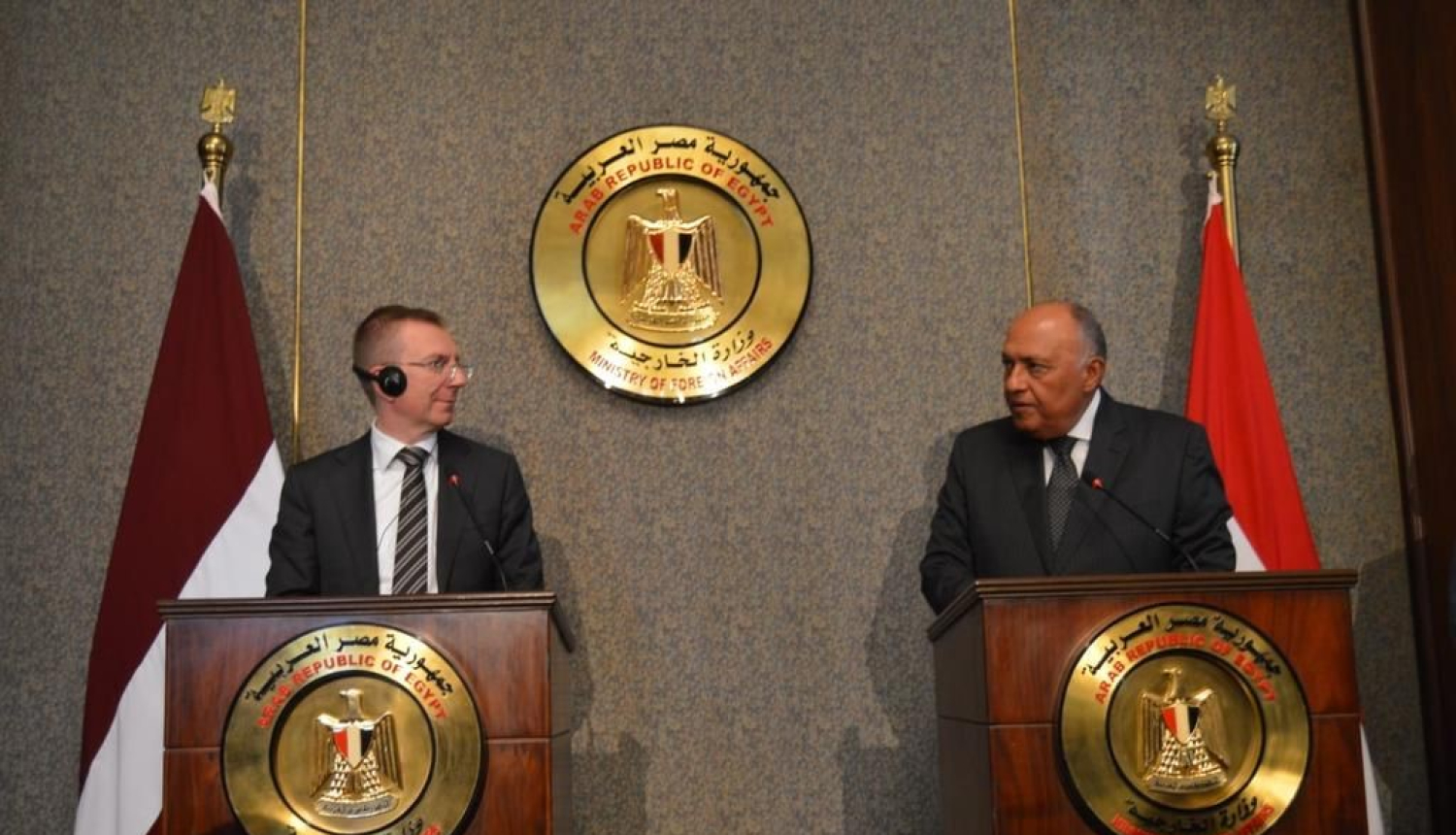On 12 June 2022, in Cairo, the Minister of Foreign Affairs of Latvia, Edgars Rinkēvičs, met with the President of the Arab Republic of Egypt, Abdel Fattah Saeed Hussein Khalil el-Sisi, the Minister of Foreign Affairs, Sameh Shoukry, and the Director of the Egyptian General Intelligence Directorate, Abbas Kamel. The officials discussed a broad array of issues, including bilateral relations between the two countries, the relations between the European Union and Egypt, and current security policy matters in the Mediterranean region.
During the meeting, Edgars Rinkēvičs expressed satisfaction with the good and constructive relations between Latvia and Egypt. This year marks three decades since the establishment of diplomatic relations between the two countries. Latvia and Egypt have set up a solid legal framework with instruments in place for the promotion of contacts in education, science and economy.
Latvia is aware of the impact of the price increase caused by Russia’s war in Ukraine on our partners in Africa, especially in Egypt. The blockade of Ukrainian ports by Russia in the Black Sea and the destruction of agricultural infrastructure is a deliberate military action not related to the consequences of EU sanctions. Edgars Rinkēvičs voiced Latvia’s support for the United Nations and the EU as they seek solutions to removing the blockade of Ukrainian ports and resumption of grain exports. We support, the Minister said, the efforts of seeking alternative routes for the deliveries of Ukrainian grain and sunflower oil by rail or by sea, circumventing Russia’s blockade in the Black Sea. For instance, Latvia has infrastructure for the export of grain to global markets; however, it is essential to follow Ukraine’s position concerning the use of potential routes. At the same time, we are aware that under the influence of the war, Egypt has been forced to put in place extraordinary measures for the stabilisation of the economic situation. We commend Egypt’s refusal to purchase wheat from the Russian ship Matros Pozinich loaded with stolen Ukrainian grain, Edgars Rinkēvičs underlined.
Both bilaterally and as an EU Member State, Latvia stands up for the need to reduce the negative impact on its African partners of the long-term food accessibility challenges and the price hike, the Minister said. We believe that support from the EU for the maintenance of fiscal and macroeconomic stability in the most-affected countries will help reduce inflation and loan repayment problems. Sustainable local food production, resilience to climate change and the diversification of delivery chains must be promoted in the long term. Latvia also supports financial assistance planned by the EU to North African countries to reduce the negative effects of an increase in food prices in the short term, the Minister stressed.
The Latvian Foreign Minister thanked Egypt for its support to the resolutions of the United Nations General Assembly condemning Russia’s aggression against Ukraine, and he called for continuing initiatives that call on Russia to stop the war, and demand that the aggressor be brought to justice. Edgars Rinkēvičs asserted that the situation with Ukraine’s ports should be addressed in cooperation with UN agencies to remove the blockade and resume exports of Ukrainian grain.
The officials also discussed the EU’s Southern Neighbourhood policy. The Latvian Foreign Minister said he firmly believed that a close EU-Egypt dialogue was mutually beneficial since it enabled the promotion, through joint efforts, of growth and sustainable development on both coasts of the Mediterranean. Latvia supports the EU’s course of green and digital transformation to mitigate climate change and create opportunities for business and investment. Cooperation between the EU and Egypt should also promote the growth of the private sector, especially in the field of innovation and digital solutions. The Agreement Establishing the African Continental Free Trade Area, AfCFTA, is a significant achievement with the potential of increasing prosperity across the continent.
The officials also exchanged views on energy policy issues. In view of Russia having proved to be an unreliable partner, to give up its energy supplies is a difficult but necessary decision for many European countries. Accordingly, the EU must ensure alternative oil, coal and especially natural gas and liquefied natural gas (LNG) supplies in the short term. In this context, Egypt has a major role to play in securing supplies of natural gas and LNG to the EU, in light of the EU’s commitment to reduce its dependence on Russia’s energy resources by two thirds by the end of the year.
The main solution to ensuring our energy supply is accelerating transition to renewable energy, energy efficiency and clean energy, for instance hydrogen-based, technologies, the Minister noted. He welcomed the EU’s intention to further cooperate with Egypt and other partners so as to promote development of those technologies, speed up manufacturing, make investment into the required infrastructure and ensure trade in energy carriers. The recently signed agreement between the EU and Egypt is bound to strengthen cooperation on climate and energy, including through increase in LNG deliveries to the EU, Edgars Rinkēvičs said.
The Minister then informed the Egyptian officials about Latvia’s plans to take part in the Sharm-el-Sheikh Climate Change Conference this coming November. Edgars Rinkēvičs also suggested that an Egyptian Embassy be opened in Riga.




